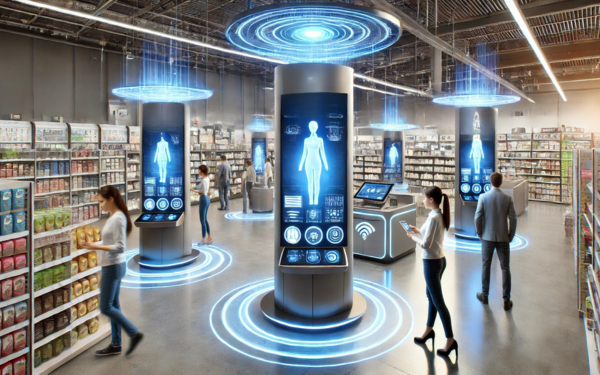How AI is Creating Opportunities for Retailers & the Impact of Self-Service Kiosks
Retail is evolving at an unprecedented pace, driven by artificial intelligence (AI) and automation. Today’s customers expect seamless, personalised, and frictionless experiences, and AI is enabling retailers to meet these expectations in ways that were once unimaginable.
One of the most impactful applications of AI in retail is the rise of self-service kiosks, which are transforming customer interactions and improving operational efficiency. Here’s how AI-powered solutions are redefining the retail experience and why self-service kiosks are a critical part of this shift.
1. Hyper-Personalisation Through AI-Driven Insights
AI-powered recommendation engines are helping retailers deliver highly personalised experiences at scale. By analysing customer purchase history, preferences, and even real-time behaviours, AI can suggest relevant products, promotions, and tailored messaging.
Self-service kiosks can leverage this intelligence to provide dynamic, personalised product recommendations at checkout or during in-store browsing. Whether it’s upselling complementary items based on past purchases or offering loyalty-based discounts, kiosks enhance the customer experience while driving sales.
2. Enhancing Checkout Speed and Reducing Friction
Customers today expect quick and seamless checkout experiences. AI-powered self-service kiosks eliminate long queues, allowing shoppers to scan, pay, and go with minimal friction.
By integrating AI-driven computer vision and natural language processing (NLP), kiosks can enable:
- Frictionless checkout with item recognition, reducing manual scanning.
- Voice-assisted shopping, making the process intuitive and accessible.
- Facial recognition for payment authentication, ensuring security and speed.
Retailers adopting these technologies not only reduce wait times but also improve customer satisfaction and operational efficiency.
3. AI-Powered Inventory Management and Smart Restocking
Stockouts and overstocking are common challenges in retail. AI-driven predictive analytics helps retailers optimise inventory levels by analysing demand patterns, seasonality, and real-time sales data.
Self-service kiosks can play a role by alerting customers to stock availability and suggesting alternatives when a preferred item is unavailable. Additionally, kiosks integrated with AI can provide insights on product popularity, helping retailers fine-tune their inventory strategies.
4. Revolutionising Customer Support with AI Assistants
Customer service remains a crucial aspect of retail success, and AI-powered kiosks are reshaping how retailers provide assistance. Advanced AI chatbots and virtual assistants embedded in kiosks can:
- Answer frequently asked questions about store policies, product details, and promotions.
- Guide customers through complex self-checkout or returns processes.
- Offer multilingual support to accommodate diverse customer bases.
By reducing the need for human intervention in routine inquiries, retailers can reallocate staff to more value-driven tasks, such as personalised customer engagement.
5. Bridging the Gap Between Online and Offline Experiences
The omnichannel experience is more critical than ever, with customers expecting seamless integration between online and physical stores. AI-powered self-service kiosks act as a bridge between these channels by:
- Allowing in-store ordering for out-of-stock items, shipped directly to customers.
- Enabling click-and-collect services, where customers can pick up online orders effortlessly.
- Providing AI-driven recommendations based on online browsing history, ensuring a consistent shopping journey.
Retailers who leverage AI to unify these experiences create a cohesive, data-driven shopping ecosystem that enhances customer satisfaction and loyalty.
The Future of AI in Retail: What’s Next?
AI’s impact on retail is only beginning. As machine learning, computer vision, and conversational AI continue to evolve, self-service kiosks will become even more intuitive, predictive, and autonomous.
Retailers who invest in AI-driven kiosks and automation today will be at the forefront of customer-centric innovation, delivering faster, smarter, and more engaging shopping experiences.
By harnessing AI’s potential, retailers can do more than just meet expectations—they can delight their customers in ways that drive loyalty, efficiency, and long-term success.




